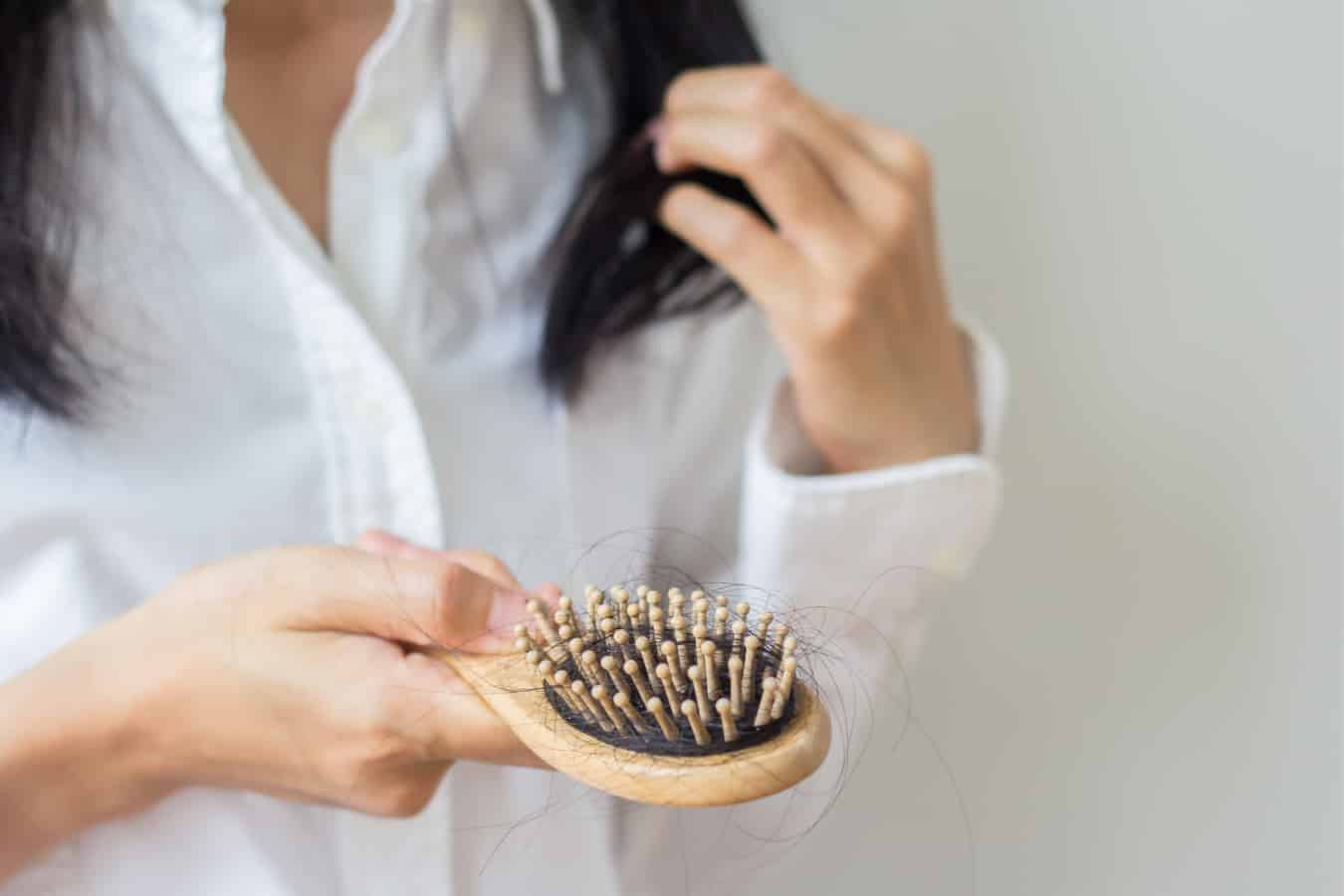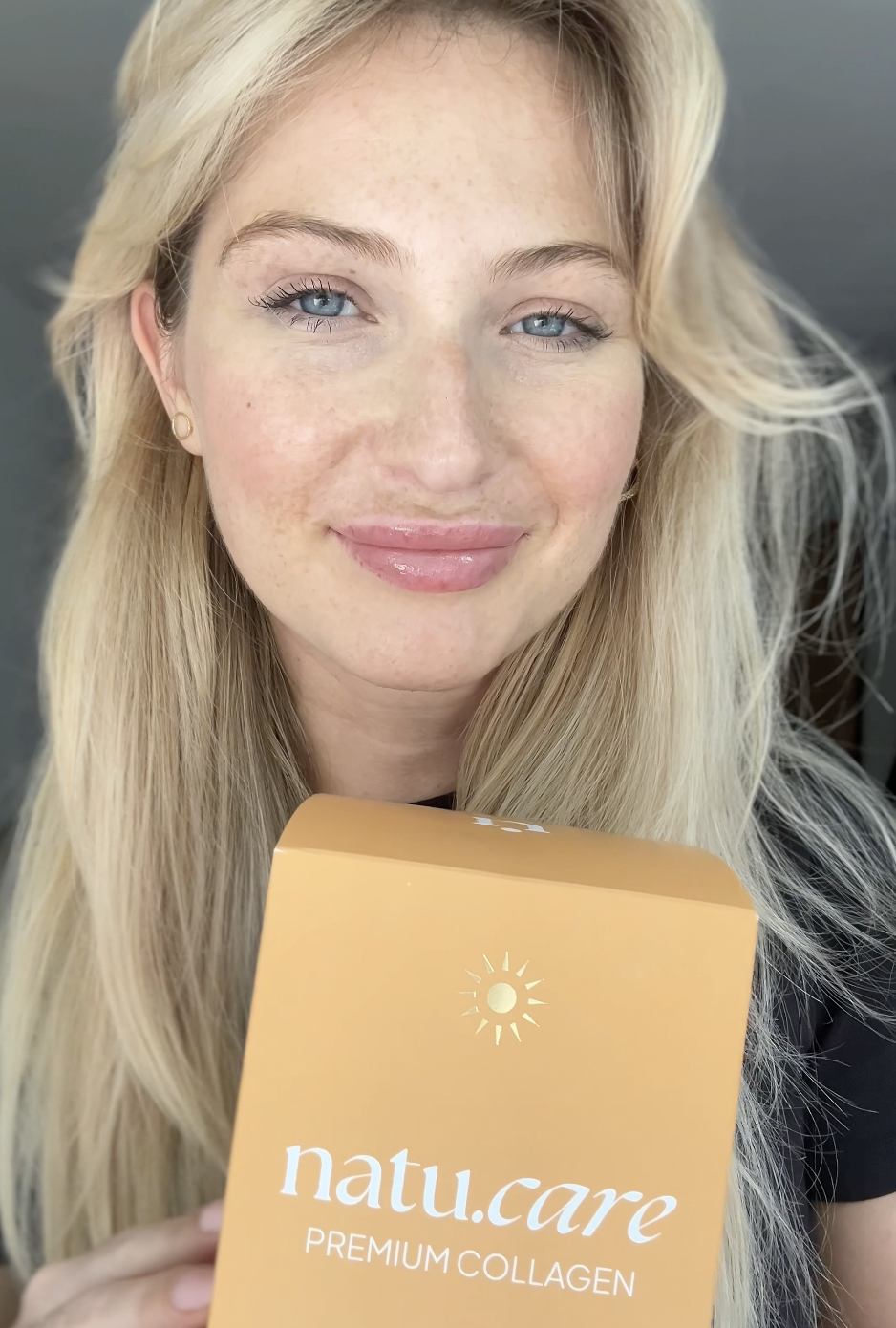Excessive hair loss - causes, diagnosis, treatment (doctor's advice)
Hair loss - causes, treatment, home remedies and tips on how to look after your hair and scalp.


Learn more about our editorial process
.

Learn more about our editorial process
.

Learn more about our editorial process
.

Learn more about our editorial process
.
Why you can trust us
Articles on Natu.Care are written based on scientific research, data from government websites and other reliable sources. The texts are written in cooperation with doctors, nutritionists and other health and beauty experts. Articles are reviewed before publication and during significant updates.
.Learn more about our editorial process
.Information about advertisements
Content on Natu.Care may contain links to products from the sale of which we may receive a commission. When creating content, we adhere to high editorial standards and take care to be objective about the products discussed. The presence of affiliate links is not dictated by our partners, and we select the products we review ourselves completely independently.
.Learn more about our terms and Conditions
.The condition of our hair can tell us a lot about the state of our health. Shiny, strong and thick hair is a sign of a healthy body. What should we do when we notice in the mirror that we have less of it and brushing it starts to feel stressful?"
With experts, we will introduce you to the possible causes of hair loss, explain how to diagnose the problem and how the treatment works. You will also learn about proven home remedies for hair loss to further support the treatment process.
The following are some of the best ways to treat hair loss.

Sprawdź, za co pokochały go tysiące klientek Kolagen Premium 5000 mg, mango-marakuja
Natu.Care Kolagen Premium 5000 mg, mango-marakuja
Natu.Care Kolagen Premium dla zdrowia stawów, skóry, paznokci i włosów. Najlepsza przyswajalność. Optymalna dawka 5 000 lub 10 000 mg. Przebadany przez niezależne laboratorium.
Zobacz więcej
Wybrałam kolagen Natu.Care, ponieważ miał super opinie – a to było dla mnie bardzo ważne! Odkąd go stosuję, moja skóra znacznie się poprawiła i jest nawilżona, a na głowie pojawiły się nowe "baby hair".@Kasia S.
See also:
- Hair collagen .
- Biotin for hair
- Hair supplements
- Vitamins for hair .
- Hair conditioners
- Hair loss supplements
- Hair loss shampoos
- Solgar Hair Skin Nails - compositional analysis .
How is hair structured?
To understand the causes of hair loss, you first need to know the structure of the hair and its growth stages.
Hair is made up of a protein called keratinand. The hair is not only the visible stem, but also everything under the skin. The hair bulb is the base of the hair follicle and within it the cells divide and grow to build the shaft. The follicle 'anchors' the hair to the skin. Blood vessels nourish the cells of the hair follicle and provide hormones that affect the growth and structure of the hair at different stages of its life.
Hair growth phases
.
Hair undergoes numerous transformations during the hair cycle. Each hair follicle goes through three phasesand:
-
Anagen, or active hair growth - lasts between 2 and 6 years.
- .
-
Catagen, which is the involution (transitional) phase - lasts from 2 to 3 weeks.
-
Telogen, which is the resting, dying and hair loss phase - lasts 3 to 4 months.
The sequence of the cycle is invariable and repeats itself many times in the life of each individual. The course of the process (e.g. the rate of growth or the quality of the hair) depends on genetics, gender, age, health, diet and the work of the endocrine glands.
When do we talk about hair loss?
.
You may lose about 50-100 hairs per day and this is a natural phenomenon related to the growth phases. A higher number, above a hundred, should be cause for concern. Does this mean that from now on you have to count every hair on your brush? Fortunately, no. Excessive shedding can be seen with the naked eye.
What should cause concern?
.
-
After combing, more than the usual amount of hair is left on the brush Remember to clean the brush of hair after each combing so that hair does not accumulate on the brush.
-
After washing your hair, you notice that there is more hair than usual in the drain or on the towel.
- After washing your hair, you notice that there is more hair than usual in the drain or on the towel.
-
When combing your hair, you notice clearances - for example, deepening bends or thinning on the top of your head that wasn't there before.
-
When combing your hair, you notice that there is more hair than usual.
-
More hair appears on the clothes you wear, e.g. on the back and shoulders of a jacket or jumper.
- You notice more hair on the clothes you wear.
-
You are finding hair on the floor of your flat, which was not the case before.
- You are finding hair on the floor of your flat, which was not the case before.
-
- Hair is in poor condition - brittle, dull, frizzy, dry or with split ends.
- Hair is in poor condition.
Collagen Booster - Glow Stories

- Active ingredients: bamboo shoot extract, Quatrefolic®, L-Methionine, L-cysteine, vitamin E, vitamin A, niacin (vitamin B3), vitamin B6, vitamin B2 (riboflavin), biotin, zinc, copper
- .
- Form: capsules
- .
- Dose: 1 capsule per day
- .
- Sufficient for: 60 days
- .
Product description
A dietary supplement containing vitamins, minerals and plant extracts thatósupport the skinóhand, hair and nails. The product is especially distinguished by the form of folate – it is Quatrefolic, whichós absorbed very well and is natural.
In addition to valuable vitamins and minerals, such as vitamin A, E, B3, B2 and biotin, the formula contains bamboo shoot extract, whichóry further enhances your beauty.
Pros and cons
A dietary supplement containing vitamins, minerals and plant extracts thatósupport the skinóhand, hair and nails. The product is especially distinguished by the form of folate – it is Quatrefolic, whichós absorbed very well and is natural.
In addition to valuable vitamins and minerals, such as vitamin A, E, B3, B2 and biotin, the formula contains bamboo shoot extract, whichóry further enhances your beauty.
Additional information
A dietary supplement containing vitamins, minerals and plant extracts thatósupport the skinóhand, hair and nails. The product is especially distinguished by the form of folate – it is Quatrefolic, whichós absorbed very well and is natural.
In addition to valuable vitamins and minerals, such as vitamin A, E, B3, B2 and biotin, the formula contains bamboo shoot extract, whichóry further enhances your beauty.
Biotebal Plus skin, hair, nails

- Active ingredients: biotin, field horsetail herb extract, L-cysteine, L-methionine, zinc, iron, vitamin C, vitamin E, niacin (vitamin B3), copper, vitamin B6, vitamin B2 (riboflavin), folic acid, selenium .
- Form: capsules .
- Dose: 1 capsule per day .
- Sufficient for: 30 days .
Product description
A complex formula based on 14 active ingredients in the form of vitamins, mineralsós and an extract from field horsetail, whichós a source of silicon. Biotebal Plus contains a large portion of biotin, whichós effective in strengthening hair, giving it shine and preventing excessive hair loss.
.Thanks to its many active ingredients, the product helps firm the skinód of the face and strengthens the nail plate.
Pros and cons
A complex formula based on 14 active ingredients in the form of vitamins, mineralsós and an extract from field horsetail, whichós a source of silicon. Biotebal Plus contains a large portion of biotin, whichós effective in strengthening hair, giving it shine and preventing excessive hair loss.
.Thanks to its many active ingredients, the product helps firm the skinód of the face and strengthens the nail plate.
Additional information
A complex formula based on 14 active ingredients in the form of vitamins, mineralsós and an extract from field horsetail, whichós a source of silicon. Biotebal Plus contains a large portion of biotin, whichós effective in strengthening hair, giving it shine and preventing excessive hair loss.
.Thanks to its many active ingredients, the product helps firm the skinód of the face and strengthens the nail plate.
Expert opinion
A complex formula based on 14 active ingredients in the form of vitamins, mineralsós and an extract from field horsetail, whichós a source of silicon. Biotebal Plus contains a large portion of biotin, whichós effective in strengthening hair, giving it shine and preventing excessive hair loss.
.Thanks to its many active ingredients, the product helps firm the skinód of the face and strengthens the nail plate.
Hair loss - causes
.
Hair loss has many causes: genetic, hormonal, environmental, related to nutrition and deficiencies (e.g. iron, vitamin B12, vitamin A), physical activity, stress and even improper hair care and styling.
Hair loss has many causes.
In the physiological course of the growth process, new hair usually replaces lost hair. Unfortunately, this is not always the case. Hair loss can develop gradually or occur suddenly. Depending on the cause, the loss can be temporary or permanent.
Effective treatment of hair loss depends on the speed and accuracy of diagnosis. Hair falls out for many reasons, at different stages of life. Below, you will read exactly why you may be losing your hair.
The following is an overview of why you may be losing your hair.
Are you looking for a dietary supplement to support your hair, skin and nails? Check out the power of the vitamins, amino acids and extracts contained in Glow Stories and enhance your natural glow!

Glow Stories - for skin, hair and nail health
.Product with high-quality folic acid Quatrefolic®, bamboo shoot extract and ingredients that have a positive effect on skin, hair and nails.
Why does hair fall out? The most common causes areand:
- Hormonal causes, e.g. thyroid disease, pregnancy, menopause. .
- Scalp disorders.
- Scalp disorders.
- Stress and living under tension. .
- Inappropriate and nutritionally poor diet, .
- Chronic diseases, e.g. anemia, diabetes, kidney disease. .
- Eating-related diseases, e.g. anorexia. .
- Response to medication being taken. .
- Inadequate hair care and styling. .
- Seasonality. .
- Age. .
Below you will read about the specifics of each cause - perhaps this will be the first step to your diagnosis.

Rise&Shine: Collagen (5000 mg) in Mango-Maracuja flavour
Rise&Shine is collagen (5000 mg) in Mango-Maracuja flavour. Proven formulation, great bioavailability and refreshing taste.

Cacao Bloom: premium collagen (5000 mg) with cocoa content
.Cacao Bloom is premium collagen (5000 mg) with Dutch cocoa. A researched formulation, convenient dosage and unforgettable taste.
Hormone support
.
Hair cells are some of the fastest growing cells in the human body. The endocrine system supports many important functions crucial to the hair growth cycle. If the hormonal balance is upset, hair loss can be one of the first signs of endocrine-related disorders or diseasesand.
Thyroid hormones should be checked and your doctor may order tests for oestradiol, testosterone, androstendione, DHEA-SO4, progesterone, prolactin.
.
Thyroid problems
.
In the process of hair growth, sex hormones and thyroid hormones are most important. They influence the regulation of metabolism and the supply of the right amount of nutrients to the hair. Both too much thyroid hormone (hypothyroidism) and too little (underactive) can cause hair lossand.
Effective treatment of thyroid disease (including the increasingly common diseases Hashimoto's or Graves-Basedova) can restore hormonal balance and stop hair loss.
When was the last time you tested your thyroid hormones? If more than a year ago, get tested - have your TSH, FT-3 and FT-4 levels determined.
Androgenetic alopecia
.
This type of alopecia, usually associated as a 'male problem', affects both men and womenand. It should be treated as two separate conditions. It has a genetic and hormonal basis. The main culprit is dihydrotestosterone, a hormone that affects hair follicle cells in two waysand:
-
Induces miniaturisation of the hair follicle, leading to shorter, thinner and lighter hair.
-
Shortens the duration of the hair growth phase and prolongs the period during which the hair follicle produces new hair after the loss of telogen hair.
- It also reduces the duration of the hair growth phase and prolongs the period during which the hair follicle produces new hair after the loss of telogen hair.
Androgenetic alopecia in men is characterised by loss of hair in the frontal angles (hair curves), and in women by hair loss on the peak of the head. Comorbidities of polycystic ovarian syndrome, insulin resistance, hyperprolactinaemia and thyroid diseaseand are important in the diagnosis, particularly in women.
It is not possible to cure androgenetic alopecia completely, but it is possible to inhibit hair loss and stimulate hair regrowth. The sooner we respond, the better the chance of keeping hair aliveand.
Telogenetic alopecia
.
Remember the description of the phases of the hair growth cycle at the beginning of this article? Telogen alopecia refers to a disturbed telogen phase. Some of our hair should be in the resting phase, but most should be in the growing phaseand.
In telogenic alopecia, the proportion is disturbed - more hair goes into the resting phase and this results in hair loss. Telogenic alopecia is treatable and full regrowth of lost hair is possible. As soon as you notice symptoms, see a specialist, such as a dermatologist or trichologist
Pregnancy
.
Do you know the wonderful tales of luscious hair during pregnancy? This is a special time in a woman's life, during which many changes take place in her body due to increased hormonal activity. Thanks to increased levels of oestrogen, especially in the second and third trimesters, mums-to-be enjoy strong hairand.
Although, sometimes pregnant women may experience hair loss, for example due to stress, poor diet, hormonal changes or vitamin deficiencies . This is normal and should subside after birth or postpartum. If you are pregnant and your hair is falling out, take advice from your doctor, but also pay attention to your diet and relaxation.
Postpartum
.
When a woman enters the difficult postpartum period, estrogen levels drop rapidly and hair may fall outand. This is natural and after about three to four months - if the mother controls her hormone levels and takes care of her diet - the hair starts to grow back. If the problem persists, blood tests should be done and a doctor should be consulted.
Menopause
.
As women age, the concentration of oestrogen and progesterone decreases. These two hormones affect the hair follicles, extending the duration of the hair growth phase. Their reduced presence in the body during the menopause can result in hair loss. This is favoured by a concomitant increase in androgens relative to oestrogensand.
Scalp disorders
.
As I mentioned at the beginning, hair is not just the shaft. Its quality and growth is also influenced by our skin, specifically the scalp. Certain skin conditions can cause hair loss. These conditions include psoriasis, ringworm of the scalp, lichen planusand.
Dandruff, seborrhoeic dermatitis and atopic dermatitis contribute to hair loss indirectly - this has to do with the patient scratching the scalp and damaging the hair follicles. Irritated skin and constant inflammation prevent hair from growing properly.
Stress
.
Permanent stress can cause hair loss and this has to do with its negative effects on the hair growth cycle. As a result of constant mental stress, many hairs go into a resting phase too quickly, which accelerates hair lossand.
Increased levels of the stress hormone - cortisol - also disrupt hair growth phases and can cause excessive hair lossand. I know that don't stress, it's.... the most annoying piece of advice you may hear, but even reducing stressors and learning to relax is very helpful.
Inappropriate diet
.
Hair without 'fuel' cannot grow properly. Restrictive diets (e.g. chronic juice detoxes), prolonged weight reduction, eating disorders (anorexia, bulimia), a poorly varied menu cause vitamin and mineral deficiencies. Hair particularly needs vitamins A, D, E, C, B, as well as zinc, selenium, iron and omega-3 acids (DHA and EPA).
Chronic diseases
.
Hair loss accompanies many chronic diseases, especially if not properly treated. Patients with anemia, rheumatoid arthritis, diabetes and thyroid disease, liver and kidneyand.
complain of hair loss.
Remember that prompt diagnosis, implementation of treatment and regular check-ups with your doctor can minimise or stop hair loss in the above diseases.
Response to medications taken
.
It is not only chemotherapy that causes hair loss. Taking certain medications can also result in hair lossand. This happens through their effect on the growth cycle. Drug-induced hair loss can be immediate or delayed, sudden or gradual, diffuse or localised.
Plegic hair loss refers to the use of, among others: certain antibiotics, birth control pills, antidepressants, steroidsand. If you are taking medication and suspect it is linked to hair loss, check the side effects in the leaflet or ask your doctor.
Inappropriate hair care and styling
.
Some hair care practices can cause weakening and hair loss.
Anna Mackojć, founder of the Trichology Institute, shares her experience:
Mistakes such as the use of aggressive hair care products, excessive use of hot styling tools, overly tight hairstyles and styles, inadequate eating habits and stress are the most common ones I observe at my Institute..
 .
.
Anna MackojćTrichologist, biotechnologist, imaging diagnostician, founder of the Institute of Trichology®
These hair styling mistakes avoidand:
- .
- use of inappropriate, tugging brushes, .
- frequent colouring, bleaching of hair, .
- frequent use of curling irons, straighteners, .
- use of excessively strong hair styling preparations, .
- frequent application of dry shampoos to the scalp, .
- use of unsuitable shampoos or oils (which, for example, clog the skin), .
- dry hairstyles and updos, .
The above practices dry out the hair, block air access to the hair follicles, damage the hair structure and can cause hair loss.
See also:
Seasonality
.
Scientists have long been looking at the phenomenon of seasonal hair lossand. During autumn and winter we may notice an increased amount of hair on the brush after combing, but this is a natural phenomenon.
Seasonal hair loss should subside on its own. During the peak hair loss season, follow a diet rich in fruit and vegetables and supplement with vitamin D. Providing your hair with vitamins and minerals can slow down hair loss.
Hair
.
Hair can fall out excessively at any age, but it is most common in people who are over 50and. At this age, the anagen phase shortens and the ratio between anagen and telogen is disrupted. Remember, however, that this is not a rule and hair loss depends on genes and hormonal status .
Hair loss after COVID-19
.
Scientists are looking at the effects of surviving coronavirus infection . Many recovering patients report a problem with hair loss. It will be several years before scientists can determine the exact mechanism and effect of COVID-19 on this ailment. Hair loss can be caused by weakness after infection, stress, the effect of the virus on the growth phases of the hair.
If we notice a problem of hair loss after COVID-19 infection, we should control basic blood tests and determine TSH and FT-3, FT-4 (when TSH values are elevated and the others are lowered, this may suggest a developing hypothyroidism).
 .
.
Julia SkrajdaDietitian
..
After an infection, let's pay particular attention to our diet. For some people, contact with the virus has significantly weakened the body, so it is important to strengthen it and provide the nutrients it needs for recovery - vitamins and minerals, adds the nutritionist.
Diagnosis of hair loss - what should be investigated?
.
You already know the possible causes of hair loss, and now it's time for a diagnosis. If you don't have regular (once every six months) basic blood tests - start doing them. And get the first test done right now.
Supportive tests for diagnosing hair loss are:
- morphology (basic and preferably extended), .
- thyroid hormones (TSH, FT-3, FT-4), .
- concentration of iron, ferritin, zinc, transferrin and vitamin B12 in serum.
These tests are the basis for the search for the cause of hair loss. They will be a good indication for the doctor and the trichologist. I have asked Dr Witold Tomaszewski, M.D., about the possibility of performing these tests within the framework of the National Health Fund.
.
Primary care physician can make referrals for: a blood count (basic or expanded), TSH (from October 2022 also FT3 and FT4 in situations where such a test can help to diagnose a disease) and serum iron determination.
 .
.
Dr. n. med. Witold Tomaszewski
.We can obtain referrals for other tests from a specialist (e.g. endocrinologist) or perform them privately.
May be of interest to you:
.
How to stop hair loss? Treatment
I have good news: you can treat hair loss effectively. The sooner you can diagnose the cause, the better the chance of regaining your lush hairstyle and confidence.
Visit to your GP
.
After you have had your blood tests, visit your GP to discuss the results. Do not check or compare your test results with the values given on the internet. Laboratories have different reference ranges, give results in different units, and often tests are performed on equipment from different manufacturers. These differences can unnecessarily stress you out or, on the contrary, lull you to sleep. It is best to hear the diagnosis directly from your doctor and not from other internet users.
The doctor may order additional tests to broaden the diagnostic pathway. He or she will interview you about your chronic diseases, medications and supplements used, diet and lifestyle. Treatment will depend on the final diagnosis - your doctor will prescribe appropriate medication or refer you to a specialist with a specific specialisation (e.g. an endocrinologist).
To the rescue - a trichologist
.
A good adjunct to treatment is a visit to a trichologist. A trichologist is a specialist who diagnoses and treats hair and scalp problems. With modern and accurate equipment, a trichologist can take a close look at your skin and hair, tailoring a treatment to your needs.
The most important tool in a trichologist's work is the trichoscope. This is a camera that allows you to see your scalp under the right magnification and light. From the image, the trichologist is able to determine what type of alopecia or dermatosis the patient is struggling with.

Anna JanaszekTrichologist Hairmitage
.When treating hair loss, the trichologist can carry out a range of treatments that are beneficial to the scalp and hair, such as needle mesotherapy, scalp peeling, and infusion.
Hair loss prevention
.
Even if hair loss doesn't affect you or you are currently on the road to curing the condition - we have some tips for you on how to take care of your scalp and hair.
Vitamins for hair loss
.
Remember to approach hair loss holistically - in addition to medications and hair strengthening treatments, pay attention to the supply of vitamins and minerals in your diet.
What vitamins and minerals help treat hair loss?
.
The best contributors to healthy and nourished hair are vitamins A, E, C, D, B vitamins and zinc, selenium, iron and silicon.
Each of these vitamins plays a different role in the body, but all are responsible for the good condition and appearance of the scalp and hair.
Home remedies for hair loss
.
We are not going to write to you that making a hair mask with specific ingredients will solve the problem of hair loss. The treatment process is long and requires patience and systematics. As you already know from the article, hair is not only the shaft, but also what is under the skin. Hair is also taken care of from the inside.
How can you support hair loss treatment? Here are a handful of tips from trichologist Anna Janaszek.
-
Regularly perform basic blood and urine tests. Early detection of abnormalities means a quicker response and determination of the cause.
Regularly perform basic blood and urine tests.
-
Sleep and relax. A nourishing sleep has an invaluable effect on the condition of the whole body.
-
Get a varied menu rich in vitamins and minerals. Start by adding fruit and vegetables to your meals. Remember to drink min. 2.5 litres of fluids a day.
-
Care properly for your scalp and hair: choose the right brush, comb your hair gently, trim the ends regularly, massage your scalp, regularly disinfect everything that touches your scalp (brushes, bobby pins, clips, pillowcases, caps, hats).
- Particularly if you have a haircut, make sure your scalp is well cared for.
-
Exercise - find your favourite activity and do sport regularly. It's not just your hair that will thank you, but your whole body too!
.
Hair facts
.
Hair in numbersand:
-
Hair grows about 0.35 mm per day, or about 1-1.5 cm per month.
-
Single hairs live an average of 6 years.
- It is not possible to grow a single hair.
-
- The average person has approximately 80,000 - 120,000 hairs.
- The average person has approximately 80,000 - 120,000 hairs.
-
An average of 87% of hair is in the anagen phase, 13% is in the telogen phase and less than 1% of hair is in the catagen phase.
- The average person's hair is in the anagen phase.
-
The number of hairs depends on their natural colour: the average blonde has 150,000 hairs, a brunette 110,000, a black-haired woman 100,000 and a redhead 90,000.
- The number of hairs depends on their natural colour.
-
One hair can withstand a load of 110 g.
- The average hair can bear a load of 110 g.
See also:
- Collagen for hair, skin and nails .
- Dangerous beauty tips from TikTok
- Conscious hair care
- Home hair care products
Summary
.
What is worth remembering from this article?
.- Hair is not only the visible stem, but also everything under the skin.
- Hair growth cycle is the process of hair growth.
- The hair growth cycle is divided into three phases: anagen (growth), catagen (transitional), and telogen (death).
- There are three phases of hair growth: anagen (growth), catagen (transitional), and telogen (death).
- The most common causes of hair loss are: endocrine system function problems, androgenic and telogenetic alopecia, pregnancy, postpartum, poor diet, stress, scalp diseases, age, seasonal and drug-induced hair loss, inadequate care.
- The most common causes of hair loss are: endocrine system function problems, androgenic and telogenetic alopecia, pregnancy, postpartum, poor diet, stress, scalp diseases, age, seasonal and drug-induced hair loss, inadequate care.
- Diagnosis is best started by testing serum levels of thyroid hormones (TSH, FT-3, FT-4) and zinc, iron, ferritin, vitamin B12, transferrin. .
- In order to effectively stop hair loss, it is important to diagnose it promptly and establish treatment with a doctor. .
- A good complement to treatment is a visit to a trichologist, a specialist in hair and scalp. .
- Remember prevention - pay attention to the supply of vitamins and minerals in your diet, take care of proper care, hygiene of the scalp and hair. .
FAQ
What is missing in the body when hair falls out?
.When your hair starts to fall out excessively, it could mean that your body is lacking nutrients, vitamins and minerals. The most common reasons for this are:
- B vitamins, .
- iron, .
- zinc, .
- biotin, .
An important building block of hair is also collagen. Unfortunately, your body produces less and less of it every year, so make sure you get appropriate supplementation. See how hair collagen works.
What diseases are evidenced by hair loss?
.The diseases and disorders that most commonly cause hair loss are:
.- androgenetic alopecia - this is usually hereditary or hormonal in origin and affects both men and women; .
- hormonal disorders - e.g. hypothyroidism and hyperthyroidism or polycystic ovary syndrome (PCOS); .
- autoimmune diseases - e.g. Hashimoto's, psoriasis, lupus, rheumatoid arthritis (RA); .
- skin infections; - skin infections
- anemia - due to iron deficiency; .
- strong, chronic stress; .
- chemotherapy; .
If you notice hair loss, see a specialist - a GP or trichologist.
What tests do you need to do for hair loss?
.If you notice that you are losing an alarming amount of hair, visit a specialist (GP, dermatologist, trichologist) to determine the cause of this condition. The following tests may be necessary to make a correct diagnosis:
- blood tests - these will determine deficiencies of vitamins and minerals;
- hormone testing - your doctor may order sex hormone testing or thyroid testing, including thyroid ultrasound; .
- examination of the scalp - microscopic analysis will identify fungal or bacterial infections; .
- biopsy of the scalp; .
- trichological examination - analysis of the hair, scalp and trichogram; .
What will work best for hair loss?
.The treatment of hair loss depends on the exact cause of the condition. The form of treatment may include measures such as:
- proper hair care - including the use of special shampoos and hair conditioners; .
- changing dietary habits - it may be necessary to supplement deficiencies and enrich the diet with omega-3 acids and vitamin D to strengthen hair; .
- pharmacological treatment - e.g. minoxidil and finasteride; .
- laser therapy - stimulates circulation in the scalp; .
- steroid therapy; .
In extreme cases, a hair transplant may be required.
.How do you stop hair loss?
.First, find out the causes - go to a specialist and have tests. Also follow a few rules that will provide additional support in your treatment:
- take good care of your hair - avoid frequent washing and hot water, use gentle styling products; .
- balance your diet - choose foods rich in protein, zinc, iron, biotin and B vitamins. Don't forget products rich in omega acids; .
- avoid chronic stress; .
- quit smoking and don't overdo it with alcohol; .
- examine yourself regularly; .
- use responsible supplementation (if necessary); .
What vitamins and minerals are worth supplementing for hair loss?
.The most important ingredients that can help you with hair loss are:
.- Vitamin A - helps with sebum production; .
- B vitamins - especially biotin, niacin (vitamin B3), pantothenic acid (vitamin B5) and vitamin B12; .
- vitamin C - helps in the production of collagen;
- Vitamin D - strengthens hair and scalp; .
- Iron - deficiency leads to anaemia; .
- Zinc - supports keratin production; .
- Omega-3 fatty acids - strengthen hair; .
- Collagen - one of the building blocks of hair; .
Consult your doctor or nutritionist before starting supplementation.
.For suggestions of specific products that you can also buy at the pharmacy, see the articles:
What cancers cause hair loss?
.Hair loss is most commonly associated with cancer treatment including chemotherapy. However, there are cancers that are a direct cause of hair loss and baldness is not related to the treatment. Hair loss is caused by skin cancers such as:
- basal cell carcinoma, .
- squamous cell carcinoma, .
- melanoma in the nodular variety, .
Research shows that hair loss may be one of the visible symptoms of ovarian cancer.
Research shows that hair loss may be one of the visible symptoms of ovarian cancer.
.
Resources
.See all
.Bayer, M., Gahrtz, M., Voss, W., Schlippe, G., & Whitfield, T. (2019). The Effect of a Food Supplement and a Hair Lotion on the Progression of Androgenetic Alopecia. Journal of Cosmetics, Dermatological Sciences and Applications, 09(04), Article 04. https://doi.org/10.4236/jcdsa.2019.94026
Chris Zarafonetis, J. D. (1950). Darkening of Gray Hair During Para-Amino-Benzoic Acid Therapy*. Journal of Investigative Dermatology, 15(6), 399-401. https://doi.org/10.1038/jid.1950.121
Do you have hair loss or hair shedding? (n.d.). Retrieved 15 March 2023, from https://www.aad.org/public/diseases/hair-loss/insider/shedding
Edge, A. S., & Chen, Z.-Y. (2008). Hair cell regeneration. Current Opinion in Neurobiology, 18(4), 377-382. https://doi.org/10.1016/j.conb.2008.10.001
Goluch-Koniuszy, Z. S. (2016). Nutrition of women with hair loss problem during the period of menopause. Menopause Review/Menopause Review, 15(1), 56-61. https://doi.org/10.5114/pm.2016.58776
Grymowicz, M., Rudnicka, E., Podfigurna, A., Napierala, P., Smolarczyk, R., Smolarczyk, K., & Meczekalski, B. (2020). Hormonal Effects on Hair Follicles. International Journal of Molecular Sciences, 21(15), Article 15. https://doi.org/10.3390/ijms21155342
Guo, D., Zhang, L., Zhang, L., Han, S., Yang, K., Lin, X., Wen, C., Tong, A., Zhang, M., Yin, Y., & Deng, B. (2022). Effect of Dietary Methylsulfonylmethane Supplementation on Growth Performance, Hair Quality, Fecal Microbiota, and Metabolome in Ragdoll Kittens. Frontiers in Microbiology, 13. https://www.frontiersin.org/articles/10.3389/fmicb.2022.838164
Guo, E. L., & Katta, R. (2017). Diet and hair loss: Effects of nutrient deficiency and supplement use. Dermatology Practical & Conceptual, 1-10. https://doi.org/10.5826/dpc.0701a01
Hadshiew, I. M., Foitzik, K., Arck, P. C., & Paus, R. (2004). Burden of Hair Loss: Stress and the Underestimated Psychosocial Impact of Telogen Effluvium and Androgenetic Alopecia. Journal of Investigative Dermatology, 123(3), 455-457. https://doi.org/10.1111/j.0022-202X.2004.23237.x
.Hair Loss: Everything You Need to Know | Push Doctor. (n.d.). Retrieved March 15, 2023, from https://www.pushdoctor.co.uk/what-we-treat/hair-loss
Kaliyadan, F., Nambiar, A., & Vijayaraghavan, S. (2013). Androgenetic alopecia: An update. Indian Journal of Dermatology, Venereology and Leprology, 79, 613. https://doi.org/10.4103/0378-6323.116730
Kumar, A. B., Shamim, H., & Nagaraju, U. (2018). Premature graying of hair: Review with updates. International Journal of Trichology, 10(5), 198. https://doi.org/10.4103/ijt.ijt_47_18
Nole, K. L. B., Nusbaum, B., Pinto, G. M., & Miteva, M. (2015). Lichen Planopilaris in the Androgenetic Alopecia Area: A Pitfall for Hair Transplantation. Skin Appendage Disorders, 1(1), 49-53. https://doi.org/10.1159/000381588
Runne, U., & Kroneisen-Wiersma, P. (1992). Psoriatic Alopecia: Acute and Chronic Hair Loss in 47 Patients with Scalp Psoriasis. Dermatology, 185(2), 82-87. https://doi.org/10.1159/000247418
Seborrheic Dermatitis and Dandruff: A Comprehensive Review. (n.d.). Journal of Clinical and Investigative Dermatology. Retrieved March 16, 2023, from https://www.avensonline.org/fulltextarticles/JCID-2373-1044-03-0019.html
Sieve, B. F. (1941). Clinical Achromotrichia. Science, 94(2437), 257–258. https://doi.org/10.1126/science.94.2437.257
Swerdloff, R. S., Dudley, R. E., Page, S. T., Wang, C., & Salameh, W. A. (2017). Dihydrotestosterone: Biochemistry, Physiology, and Clinical Implications of Elevated Blood Levels. Endocrine Reviews, 38(3), 220-254. https://doi.org/10.1210/er.2016-1067
Trichotillomania (hair pulling disorder). (2021, February 10). Nhs.Uk. https://www.nhs.uk/mental-health/conditions/trichotillomania/
Types of Hair Loss. (n.d.). Retrieved March 15, 2023, from https://nyulangone.org/conditions/hair-loss/types
Vincent, M., & Yogiraj, K. (2013). A descriptive study of alopecia patterns and their relation to thyroid dysfunction. International Journal of Trichology, 5(1), 57. https://doi.org/10.4103/0974-7753.114701
Wall, D., Meah, N., Fagan, N., York, K., & Sinclair, R. (2022). Advances in hair growth. Faculty Reviews, 11, 1. https://doi.org/10.12703/r/11-1
.Yang, F.-C., Zhang, Y., & Rheinstädter, M. C. (2014). The structure of people's hair. PeerJ, 2, e619. https://doi.org/10.7717/peerj.619
.
Editorials
Meet the team


Editor
Graduate of Journalism and Artes Liberales at the University of Warsaw. Since 2017, he has been working with the biggest portals in Poland and abroad as an editor. Previously worked for 3 years in one of the leading pharmaceutical companies - he knows the health and beauty industry inside out. In his free time, he most enjoys playing tennis or skiing.

Find out what to do when hair starts to fall out by the handful.

See how to effectively moisturise dry hair.
![Hair oiling: overnight, wet, dry [home remedies].](https://cdn-resources.natu.care/uploads/1/side_view_man_hair_slugging_night_routine_1_95e3d6a24c.jpg)
Everything you need to know to do hair oiling at home.
